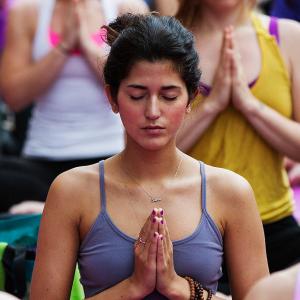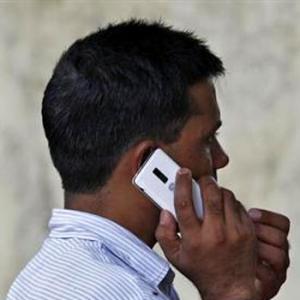
Over two years since the Nirbhaya rape shook the nation women in New Delhi feel no safer than they did before. With safety apps to self-defence classes on the rise, Ritika Bhatia takes a look at what working women in Delhi are doing to keep themselves safe.
An anonymous submission in response to a question I posted on an online gender-based violence forum, asking women about the quality of life in Delhi and the measures to improve it, fetched this reply: "Many young women like me are giving lucrative, exciting job offers in Delhi and its suburbs a pass because of the hostile conditions that prevail."
As I talk to other young women in the city, it becomes clear they are all grappling with fear in some measure.
Ishwara Kumar, a 26-year-old architect, moves around in Delhi under the stifling gaze of her anxious parents, yet when she goes abroad, even to an unknown city, her parents raise no objections. She drives around Delhi in her own car, but feels carrying a firearm is the only way "I'd feel truly safe in the city".
Kashika Gera, 23, doesn't go to clubs or pubs in the company of less than three people. "I'm alert and whenever I cross any male on a busy road I keep both my hands open in front of my bust to avoid getting groped. Oh, and I always keep a pepper spray handy."
If they are afraid, there is good reason for it. According to data provided by the Delhi police, there were 2,166 reported rapes in 2014 in the city against 1,636 in 2013, a rise of 32 per cent. Gender-based offences accounted for 70 per cent of all crimes reported in the capital last year.
Women are reacting in different ways after several incidents of attack against them in buses and cabs, and public spaces came to light.
Self-help groups and Delhi police have lent a hand. A small economy has taken shape around the scare: sellers of personal safety devices, driving schools, car makers, developers of safety apps, trainers in self-defence have all seen a rise in business.
Women in Delhi have over 15 safety apps to choose from.
Most of them alert a list of emergency contacts, and transmit the victim's location through GPS. The newer of these don't even require the app to be opened -- for instance, just shaking the phone three times activates the emergency contacts.
The most popular of these, with around 10,000 downloads, is Safetipin designed by Jagori, a women's resource group, in conjunction with UN Women. It uses crowd sourcing to rate the safety score of areas in Delhi based on seven factors including lighting, population density, transport and gender diversity. It also acts as a personal GPS tracker, allowing users to be tracked or to trace a loved one.
Delhi police launched a safety app called Himmat at the start of the year, which has been downloaded 8,296 times till date. It facilitated 3,527 distress calls, majority of which were accidental or test calls, "all of which received assistance".
The police have also launched WhatsApp and Hike groups where women can send photos of "undesirable elements".
But apps can be of little value when a woman is accosted in a dark alley.
One way out is to learn self-defence. This is what women seem to favour most. From a mere 5,000 participants in the whole of last year, Delhi police has trained 68,300 women this year across the city till May 31, indicating a massive jump since last December when the alleged Uber rape made headlines.
Offices too want their women employees to be prepared. Self Defence, a private fitness company, has conducted close to 250 trainings for companies such as HCL, Ranbaxy, Iris Software, IBM, Indigo Airlines and SRF -- a 60 per cent increase in the last three to five years.
Vincent van Gogh once said, "I often think that the night is more alive and more richly coloured than the day.”
In the outrage that followed the Nirbhaya rape in 2012, one set of protests that struck a chord among women of my generation was called Take Back the Night and Reclaim the Night, echoing earlier global feminist mobilisations that staked a claim on women's right to the night.
Then in 2013, smartphone taxi aggregators made their foray into the Indian market, and claimed to provide legions of women a safe haven post twilight within the underbellies of Delhi's notorious transport system.
That mirage too was shattered after the Uber case, where a 27-year old executive was allegedly assaulted in her cab on the way back from a party in Gurgaon.
For many working women in the city, cabs have become a necessity. But lately, when most women I know step into a cab, the first thing they do is to inform their parents of their whereabouts and forward the cab details, including the driver's picture, to their emergency contacts.
Then they call a friend and stay on the phone the entire duration of the ride, keeping them updated about every turn the cab takes.
There are many women who are taking up driving as well - to avoid cabs: According to a spokesperson for Maruti Suzuki, between 2010 and 2015, the percentage of women among students enrolled in its driving schools across Delhi and its suburbs has jumped from 40 per cent to over 50 per cent.
Taxi operators, aware that trust in their drivers has hit rock bottom, have introduced hi-tech safety measures.
Uber claims to have tightened its security features, which includes "re-verification of all driver partners with the police, additional background screening, and the establishment of a dedicated local incident response team to handle critical situations".
Another upgraded feature allows the passenger to send real-time GPS tracking and full trip details to up to five pre-selected emergency contacts. There is now also an SOS button provided directly in the Uber app so that riders can immediately contact local authorities in the event of an emergency. Some "by women, for women" cabs too can be seen on Delhi's roads. Meru Eve, for instance, has 100 such cars in service.
Anusha Bhargava, a resident of Lucknow who visits Delhi often, always keeps a pepper spray at hand and has recently picked up a stun gun as well.
"If you want to reclaim spaces that have so far been denied to you, then you need to engage in means that are understood by the perpetrators -- one of the things is being aggressive and using not violence, but the threat of violence," she says.
Reports of a spike in the demand for gun licences for women have constantly circulated after the Nirbhaya case, especially since the launch of Nirbheek, the compact revolver built by Indian Ordnance Factory especially for women. The battle for gun rights is ongoing as gun licences are odiously hard to get across the country.
Jitender Dhawan, proprietor of Sharda Gun House in Ramesh Nagar, says there has been a slight increase in women coming to buy arms for personal safety, but half the women who come to him are struggling to receive licences.
The Delhi police licensing officer doesn't disclose the exact number of women who have applied or have been awarded licences in the last few years, but mentions that the number is still relatively small (five or seven women for every 100 men).
While guns may sound like an extreme measure to many, there are various other self-defence devices that have taken the market by storm. From pepper sprays to stun guns, from keychain alarms to folding credit card knives, the self-defence market is taking baby steps in a largely untapped market.
The sales of pepper spray have rapidly picked up over the past two years, according to economist Shruti Kapoor who started an online store for such devices called Sayfty in April 2013.
"In 2012, there were only three main brands of pepper spray, by 2015 there are 30. There has been an almost six-fold increase in the sales and manufacturing of pepper spray in India in the period 2012-2015," she says.
SafetyKart, an online store founded in February 2013, sells pepper spray, ninja kubotan (a keychain), emergency lights and alarms.
It has observed "upwards of 20 per cent quarter-on-quarter growth over the last 12-18 months," says its COO, Kunal Anand.
Amrinder Pal Singh, the owner of Mascot Technology, a self-defence equipment manufacturer, says that sales have shot up from 40-50 devices a month in 2010 to 140-160 now.
"Our main buyers include college girls living away from their hometown, and women who work night shifts at call centres and other offices," he says.
Most chemists across the city stock pepper spray, and markets such as Palika Bazaar and Shadipur sell a variety of stun guns. At one electronics shop in bustling Palika Bazaar, the shopkeeper tells me that the stun guns are all sold out.
"Which one do you want, the lipstick, the torch or the mobile phone? New stock will come soon." When I enquire about the prices and the voltage, I'm told, "Don't worry, one good shock will send your attacker to the ground." However, there is some confusion about the legality of stun guns, with a senior Delhi police officer himself unsure if their use is legal or not.
Activists are largely on the fence when it comes to self-defence devices, which they view as mere Bandaids for a deeply endemic wound.
Shreya Ila Anasuya, writer and activist, says that women have strategised for nearly all their lives since they became aware that they are sexualised by men.
"We adopt various strategies by which we manage our daily existence: on a day-to-day level, it can range from something as small as plugging in earphones so I don't hear lewd comments being uttered while I navigate streets, to something as large as organising mass campaigns and protests against rape."
She believes that focusing on individual women's strategies is unhelpful, as it is a systemic problem which needs a systemic response. In a way, it also puts the onus of women's safety back on women themselves, instead of the state.
It is also true that the most primitive method of controlling sexual assault -- segregation of the sexes -- has helped. For instance, most women consider the Delhi Metro as the safest mode of transport after the women-only coaches were introduced five years ago.
As I take another cab after a late night at the office, the Ola driver overhears me telling my mother that I am taking the office car. He prods, and I tell him that ever since the Uber case, my parents start panicking about the idea of their daughter taking an Ola/Uber late at night.
The driver, Vijay Bahadur, tells me what thousands of others drivers have been saying since last year. "Just because of one man's harkat, don't judge all of us."
As he drops me off at my destination, he tells me it's important to be careful, but never to be fearful. Where the mind is without fear… Indeed.
Image: Demonstrators wait to board a bus which the protesters said was the last bus from Shivaji Stadium bus terminal, to demand for the availability of safer public transportation for women in the city during late night hours. Photograph: Mansi Thapliyal/ Reuters











